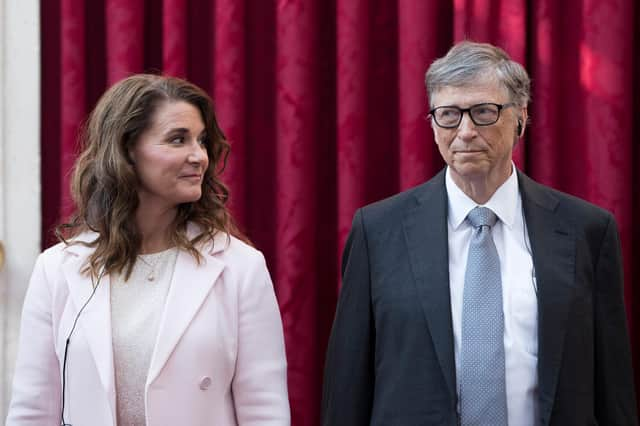Will silver splitters fuel a rise in the number of pre-nups? - Denise Laverty


While we are yet to see the full impact that the pandemic might have had on relationships, one trend that has emerged in recent years is that more people over the age of 50 are separating – many of whom have been married since their 20s. While separations later in life can take some by surprise, there may be many reasons why people choose to wait until their 50s or 60s to split; from making sure they are more financially independent, to waiting until their children have turned 18.
The recent news of Bill and Melinda Gates’ divorce took the world by surprise – a union that seemed eternal through the Bill & Melinda Gates Foundation. However, according to reports (and the notorious rumour mill), they had been living somewhat separately for years and had waited until their youngest daughter turned 18 before going public with the end of their 27-year marriage.
Advertisement
Hide AdAdvertisement
Hide AdSomewhat more surprising was that they did not have a pre-nuptial agreement in place before they married, despite Bill being considerably wealthier than Melinda at that time. Unsurprisingly therefore, if reports are true, it took years of consulting lawyers to negotiate the terms of their separation agreement.


While by no means a standard pre-wedding activity, pre- (and post-) nuptial agreements are more generally considered to be something that only high profile and/or wealthy individuals would consider; Rupert Murdoch was reported to be a fan. Unfortunately, there is also the perception that the very mention of a pre-nup is unromantic and signals impending doom on a marriage or civil partnership. No one wants a relationship to be fated before it begins.
Yet, as we see more of the ‘silver splitter’ generation looking to perhaps remarry for a second (or even third) time as well as people generally marrying for a first time later in life, there’s more chance that individuals will enter into nuptials with their own business, property or other financial assets along with children from a previous marriage or relationship. All these elements are good reasons why a pre-nup should be considered to ringfence such assets from any claim should the marriage fail.
While there remains a stigma around the act of arranging a pre- or post-nup, for anyone who has built up a reasonable financial or property portfolio and wishes to protect that for children or their business partners, it could be argued that it is irresponsible not to draw up such an agreement.
Turned on its head, you wouldn’t think twice about taking out travel insurance before going on holiday; you would simply pay the fee and head abroad, hoping you didn’t need to make a claim. Pre-nups are a similar insurance concept and, as a society, should we not consider how the act of marriage has evolved and adjust our thinking to reflect the higher levels of independence, assets and wealth which we bring into a relationship?
Is it wrong for those approaching marriage to think with more of a business mindset? Drawing up a pre-nup is something both parties must agree to – and bear in mind that the act of putting one in place could end up significantly less expensive than progressing a court action, should it all end in divorce.
Putting a pre-nup in place may even have the opposite effect to what many think – strengthening the relationship rather than weakening it. Being open about financial situations can then turn into a conversation about expectations, values and goals, making for an extremely positive outcome. By having these honest and transparent conversations before getting married, this – in some cases – can reaffirm the relationship and create stronger communication within it.
There is still some way to go before the negative perception of a pre-nup will be allayed. However, perhaps with more people – particularly silver splitters – adopting pre-nuptial agreements it may demonstrate responsible practice which may trickle down younger generations.
Denise Laverty is a Partner in Family Law, Gilson Gray